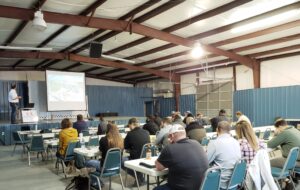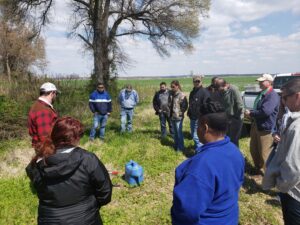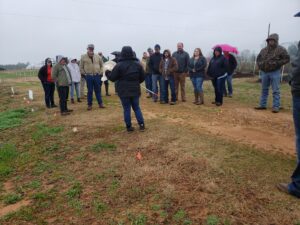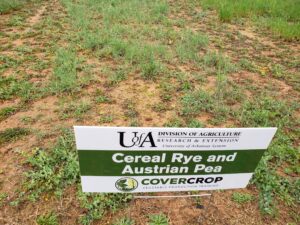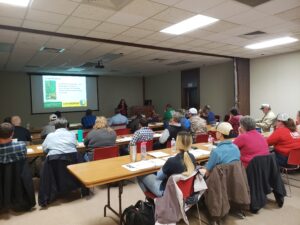Final report for ES17-135
Project Information
In order to increase the use of cover crops as a management technique for vegetable production systems in the Mid-South region, growers and Extension personnel must be appropriately educated. This project seeks to provide such education in Arkansas by using University of Arkansas Cooperative Extension Service (UACES) Horticulture Specialists, a UACES soil health instructor and a NRCS Agronomist in a “train-the-trainer” model to educate UACES County Extension agents, NRCS agents and grower “leaders”. These trainees will then train other agents and growers on cover crop use. We expect to increase agents’ abilities to make recommendations on the use of cover crops and to subsequently increase grower’s adoption of cover crops. A total of 66 CES and NRCS agents were trained using the developed suite of materials (7 PowerPoint training modules, and 10 videos) and instructed on how to use these resources. In surveys conducted at the end of each training 98% of participants said the training increased their “confidence in answering questions related to cover crops”, tests of their knowledge showed a 25% increase in comprehension on average compared to comprehension prior to the training, and 55% planned to conduct their own cover crop training in the upcoming year using the developed training materials.
- At the end of the two year project a minimum of 20 UACES and 20 NRCS agents trained in workshops will be able to answer basic questions with 75% proficiency on cover crop: selection, management and impacts on soil health and IPM. Improved agent knowledge regarding cover crop management will result in increases in cover crop recommendations to their clientele.
- In the year following the termination of the project 50% of workshop participants will conduct a training in their local area reaching a minimum of 300 new farmers statewide, who will increase their knowledge and capacity to manage cover crops resulting in increased adoption of cover crops into vegetable production systems in the years following training participation.
- A suite of educational materials will be produced and shared with agencies across the Mid-south reaching a minimum of 500 people in the region in the second year who will increase their knowledge of and capacity to implement cover crops into vegetable production systems.
- Collaboration with two Arkansas growers who effectively integrate cover crops into their vegetable production systems will highlight their successes to agents and growers in the region which will reinforce knowledge learned in workshops and contribute to increases in cover crop adoption by new growers in the years following the project.
Research has established the benefits of integrating cover crops into crop rotations on soil health, plant nutrition, and integrated pest management (IPM). Widespread adoption of cover crops into vegetable production systems in the Mid-South region however has not yet been observed. Lack of awareness of the benefits of cover crops and management techniques likely contributes to the lack of cover crop adoption in the region. In order to combat this lack of knowledge this project seeks to develop cover crop curricula to train select UACES Extension agents and NRCS agents who will then deliver effective trainings to growers and thereby increase cover crop adoption in the state.
To assess Extension agents, NRCS agents and grower’s current knowledge and use of cover crops in vegetable production systems in Arkansas, the principal investigators (PIs) will conduct an online survey in early 2017. The PIs will attend UACES’ three annual district meetings in the spring of 2017 to introduce the project and encourage agents and their clientele to participate in the survey. The survey will also be distributed through established grower list-serves and social media. Conventional and organic growers will be targeted, as both can increase their use of cover crops to manage soil health and improve the sustainability of their production systems.
In year one of the project, surveys of UACES agents, NRCS agents and growers were conducted to determine the extent to which cover crops are used in vegetable production in Arkansas and where there are gaps in knowledge. The survey results directed the production of training materials such as PowerPoint presentations, demonstration videos, and fact sheets. These materials ultimately will be posted online and shared with SARE and its constituents, thus increasing the reach of our project beyond Arkansas itself. The second year of the project included training agents in workshops using the produced training materials and conducting on-farm cover crop demonstrations with grower “leaders” across Arkansas. At the end of the two year project, we surveyed changes in knowledge, attitudes, and acreage of cover crop use in vegetable crop systems in Arkansas. Participating agents will replicate trainings in their home counties and also report participation data.
At the UACES district meetings, PIs will interact with agriculture agents from Arkansas’s 75 counties and identify 5-7 UACES agents from each district who are interested in being trained as agent “leaders”. This approach will empower individuals with the greatest need and interest in cover crop training, which will increase the sustainability and success of programming.
Results from the online survey will guide the development of training materials to grower and agent needs. Training materials will include the following information:
- Benefits of cover crops on soil health, plant nutrition, and IPM (disease, beneficial insects and weed suppression);
- Strategies for incorporating cover crops into rotations;
- Cover crop selection, seeding rates, and termination methods for the Mid-South region.
Types of training materials will include:
- 10 demonstration videos highlighting important facets of cover crop management and interviews with three Arkansas growers who use cover crops in vegetable production systems;
- 8 PowerPoint presentations;
- A ‘Cover Crop’ page on the UACES Horticulture website to serve as the portal for the project and to house educational training materials developed. Housed at: www.uaex.edu/sarecovercrop
- Links to SARE cover crop resources.
Cover crop demonstration plots were planted at the University of Arkansas Southwest Research and Extension Center (Hope, AR) during the late spring and early fall 2017 to provide accessible plots for use in video production. Genetically engineered varieties or organisms will not be used.
The PIs are currently conducting cover crop research for fall-planted vegetables and are planning trials on winter cover crops with summer vegetables. Results will available for the second year of this project and will be incorporated into training materials to provide specific, researched-based recommendations to Arkansas growers.
In year two training workshops were held with agent “leaders” in each of the three UACES districts, NRCS agents and cover crops demonstrations will be established on grower “leaders’” farms within each district. One day workshops will include three hours of classroom, lunch and two hours of field training in “grower leader” demonstration plots to highlight planting techniques and management. Lunch will be provided to facilitate the short schedule and movement between sites. Binders were provided to agent “leaders” that will contain all the materials needed to conduct their own training on cover crops. A follow-up survey was administered after each workshop to assess changes in county agents’ and participating growers’ knowledge, attitudes, and anticipated impact on cover crop acreage in Arkansas. Results were used to modify training materials as needed prior to final publication. All agent “leaders” were encouraged to hold at least one training session in the following calendar year and to report attendance and impact data.
The project has concluded with the release of all educational materials on the SARE website for use by other Extension systems in an effort to expand the reach of the project on improving agricultural sustainability across the south.
Cooperators
- (Educator)
- (Educator)
Education
Training materials on the basics of cover crops were developed in order to train University of Arkansas Cooperative Extension Service and Natural Resources Conservation Service (NRCS) agents. These resources were then made available to agents for use to conduct their own trainings. The training materials consist of short videos and power point presentations. The material was reviewed by other UACES extension specialists, Dr. Trent Roberts and Dr. Bill Robertson. Three trainings were held during the spring of 2019 in different geographic regions of the state of Arkansas. Farmer collaborators were involved to host demonstration plots and given the chance to plant cover crops on their own ground. Their expertise was then used to train agents during the workshop. The trainings consisted of class room instruction and vising field demonstration plots in farmer's fields. The agents were given a pre- training and post-training test to assess how their basic knowledge of cover crop management across a range of areas was impacted by attending the training.
Education & Outreach Initiatives
Determine learning, extension material needs and opportunities to improve extension's service to growers through the development of the curriculum
A survey was conducted with growers and extension agents in the state on current knowledge, knowledge gaps and needs for educational resources of both county extension agents and farmers.
Key areas of education needs, type of education outreach preferred by growers and methods were identified and will be implemented in the development of the training protocol
Educational videos and PowerPoint presentations about cover crop selection and management will be produced and shared with extension agencies and NRCS offices across the Mid-south reaching a minimum of 1,000 people in the region during the second year who will increase their knowledge of and capacity to implement cover crops into vegetable production systems
Cover crop "how-to" and "basics" videos were developed in conjunction with UACES communications department staff and grower Adam Chappell. PowerPoint presentations covering the basics of cover crop selection, termination and management were developed. All PowerPoint presentations are about 15 minutes long and can be combined to develop a short or long training. Research based cover crop management recommendations are cited in each presentation. Cover crop demonstration plots were established at two farms during the fall of 2018, an additional plot was established at the University of Arkansas Southwest Research and Extension Center. Heavy rain in the fall and winter of 2018-2019 made cover crop plot establishment difficult. Ultimately the demonstration plots were used to train county agents in hands-on activities during the trainings. Some of these demonstrations included soil water infiltration, scouting for insects and taking cover crop biomass samples for nitrogen estimation. Cover crop seed boards were built to show what different cover crop seeds look like. Small pots of common summer cover crops were seeded to show participant what warm season cover crop species look like. The training materials were delivered in three 5 hour workshops to 66 participants. Feedback from participants was used to fine-tune the materials. Binders of the printed PowerPoint materials were distributed to participants so they could take notes.

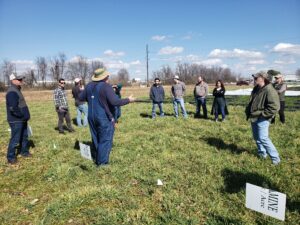
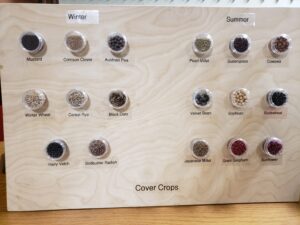
These videos and training materials were used to train 66 UACES and NRCS agents. To date the videos on You-Tube have reached over 1,000 people. At the end of the training a majority of the agents trained said they planned to conduct their own cover crop training in the upcoming year using the developed training materials. 98% of participants said the training increased their “confidence in answering questions related to cover crops”
To advertise the outputs of the project and continue to develop UACES agent's knowledge and skills with regards to cover crops.
Five UACES county agents and a project PI and staff member attended the 2019 Southern Cover Crop Council Summer Conference in Auburn Alabama. A Poster Presentation on the success and outputs of the project was presented. County agents participated in educational workshops and attended field demonstrations.
Agents took their knowledge back to their home counties with plans of sharing it with their clients. A larger number of research, extension and growers were exposed to the resources developed by the project.
Educational & Outreach Activities
Five county agents were taken to the Southern Cover Crop Council Summer 2019 Conference and participated in educational sessions.
Participation summary:
Learning Outcomes
Project Outcomes
Our project goal was to develop a suite of materials that agents can use to conduct outreach and education on cover crops in the Southeastern United States with a focus on vegetable systems. A total of 66 CES and NRCS agents were trained using the developed suite of materials (PowerPoint training modules, and videos) and instructed on how to use these resources. The agents were given a pre- training and post-training test to assess how their basic knowledge of cover crop management across a range of areas was impacted by attending the training.
98% of participants said the training increased their “confidence in answering questions related to cover crops”. On average agents improved their tested knowledge of cover crops by 25% based on comparisons of pre- and post- tests.
At the end of the training a majority (55%) of the agents trained said they planned to conduct their own cover crop training in the upcoming year using the developed training materials. Others indicated they would conduct a training in the upcoming 2 years. To date the YouTube videos have more than 1,000 views. All of the materials are available for download at: www.uaex.edu/sarecovercrop and all of the videos can be accessed on YouTube on this playlist: https://www.youtube.com/playlist?list=PLs8WSjmcoHZfcuJx-GRpvsUoY2Az0-dYB
Some of the feedback we received on the end of project surveys includes:
“I liked the different views on cover crops used in horticulture, most trainings are geared toward row crops”
[Participant liked] “how the presenters made complex topics simple.”
“Information is readily available for use by anyone.”
